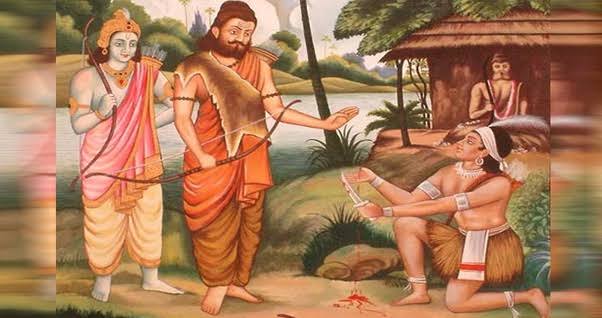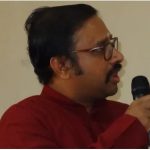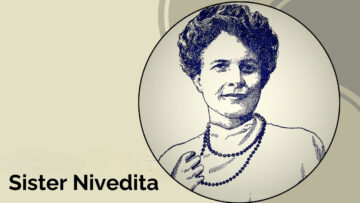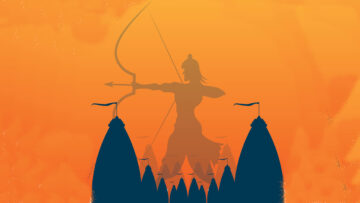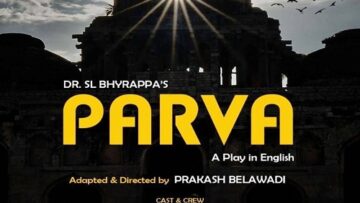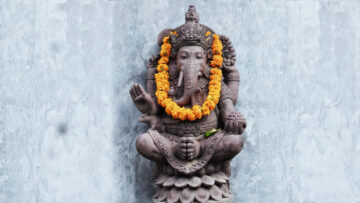Mahabharata, in many ways, is the tragedy of a collection of inabilities – to make exceptions when required, and to not make exceptions when one should not. If the venerable Bhishma is a great example for the former, the great Dronacharya is for the latter. Although the Mahabharata itself is quite categorical in its judgement of Dronacharya, this aspect is often missed, as the devil is in the detail.
Drona’s fall is very stepped, steady, continuous, and eventually very grand. In fact, his fall is the grandest and the steepest of falls, much more than Duryodhana at a very personal level. He falls from a very high point to a very low point in the value spectrum of the civilization.
It is important to remember that Drona belonged to the high family of Bharadvajas. It was a Bharadvaja who was the priest of King Bharata, on whose name the dynasty ran, and often referred to as the ideal by subsequent kings of Kuru-Panchala clans. The first Bharadvaja was the son of none other than Sage Brihaspathi and the grandson of Sage Angirasa. The latter is most venerated in the Vedas and later tradition.
The later generations of Kuru clan moved to the Vishwamitras and Vasishthas, and the Bharadvajas may have lost of the exalted status. The net result was that the family retained high status of knowledge, without the high seat of power.
Coming to Mahabharata, the first turning point seems to be Drona studying alongside king Drupada in the Gurukula and making a strong friendship. In an emotional moment of friendship Drupada, the future Panchala king, makes a promise of eternal friendship of equality to Drona; which the latter does not weigh at that moment, but does not forget either. However, poverty drives Drona to go to Sage Parashurama, who was distributing the wealth acquired from Kshatriyas.
Having already distributed all material wealth to other Brahmanas by the time Drona reaches him, Parashurama is left only with his divine weapons which he offers. Drona does not think twice. He has himself done no penance to acquire divine weapons.
He has absolutely no purpose for those. He still does not exactly know what he wants them for. Unlike Kshatriyas, being a Brahmana, he does not have a tradition around them; nor a code of conduct for their use. Yet he acquires them, without thinking through the consequences. He has clearly stepped out of his boundaries, which is the first step that could lead him towards definite adharma.
Drona continues to remain in poverty. He marries Krupi, the sister of Acharya Krupa. The brother-sister duo have been brought up by Bhishma. Krupa is the teacher of all Kshatriyas of Hastinapur. But Drona’s material status does not change, as he seeks his independence. He cannot provide enough for the family as a teacher, in spite of his prowess; the family is run only by the strenuous efforts of Krupi. He is yet unable to convert his abilities into a successful profession in those changing times.
The second turning point comes when his son Ashvatthama is taunted by his friends for not being able to distinguish between milk and water mixed with flour. They further insult him for not being able to afford milk. His cries for milk turn the spine of Drona– the beginning of a journey of putramoha – blind love for his son.
Unable to bear the humiliation of not being able to provide enough for the family, he wanders around many places of Aryavarta for wealth; and eventually remembers the promise made by his friend Prince Drupada in the Gurukula. He chooses to swallow his pride, and seek help by rekindling and invoking the friendship.
He goes to the palace of King Drupada. Neither does the palace treat him with any respect, nor does the King recognize him. Drupada has changed. He does not even look at him. Clearly Drupada deliberately chooses to ignore Drona, and does not want to be associated with a poor Brahmana as friend. Drona, as a Brahmana had every right to seek alms and help. But he makes the grand mistake of reminding King Drupada of their teenage friendship which enrages him.
Drupada repudiates their friendship, and delivers an absolute humiliation (Note that this is very unlike how Sudama seeks help from Lord Krishna. Sudama is humble throughout; and waits for Krishna to recognize and grace him.) The grand pride of this great Brahmana of Bharadwaja clan is hurt. A Brahmana of great learning and penance should have forgiven Drupada. His anger should be directed towards the greater good of the society.
However, Drona is yet weak in penance and great in ability. He allows his pride to be hurt, mind directed by ego, and fills himself with a lowly ambition of personal revenge against Drupada. He continues of wander in Aryavarta and eventually lands up in his brother -in-law Krupa’s place. The rest is quite well known – Drona impresses the Kuru princes by taking out the ball and ring from the well, using enchanted grass as arrow.
Bhishma recognizes that the person is Drona and immediately seeks him as the teacher of dhanurvidya – the craft of weaponry. A complete step out for a Brahmana sage. Drona not only agrees but seeks high status, exalted freedom, material, and space which are all readily granted by Bhishma; for he has never made a mistake in recognizing an ability. Thus, Drona dedicates himself to teaching in particular only the princes of Hastinapur, and Kshastriyas in general.
This too is a step-out of his natural traditional realm. This is no independent ashrama run by a kulapati, but a one wholly owned and run under the aegis of Hastinapur; although Bheeshma has given him the freedom to run it the way he wants. The ego of Drona is growing and his penance weakening, and the use of Shastra-Astras blinding.
The grand ego of Drona should have by now been satisfied. Alas, that is not to be. He is preparing the Kuru princes, but not just for their Kshatriya dhar,ma of protecting the kingdom and upholding the larger dharma. He has an ulterior personal motive, that even the ever alert Bhishma and far-sighted Vidura are not aware of.
This apart, he is continuously thriving to keep the best of his knowledge and prowess for Ashvatthama, without any concern towards his worthiness. He is teaching him secrets of great weaponry even ahead of Arjuna; which the latter finds and makes sure to learn. This had no other larger purpose apart from absolute putramoha.
Realizing Arjuna’s enormous zeal, hunger, and ability, Drona makes a grand promise of making him the greatest archer of the times; Arjuna’s achievements were to add to his personal glory without a larger purpose. When providence defeats him in the form of Ekalavya, the great Acharya should have simply accepted defeat, and seek forgiveness from Arjuna.
If Bhishma were to learn of Ekalavya’s excellence, he would at best constrain him or force him to be aligned to Hastinapura. But Drona’s bruised ego, and desperation for personal glory, blinds him yet again. He does not hesitate to snatch that very instrument of Ekalavya’s excellence – the thumb – in the most disgusting manner, which makes even Arjuna very sad.
Arjuna only questions Drona about his promise, but does not propose to retain his future glory in the most adharmika manner. Tradition is categorical here that Drona acted on his own, and for absolute personal purpose. His act has no defence in tradition; and it has always remained a matter of fall from grace for Drona. The continuous fall is very steady.
The real ulterior motive is to unfold later. After the completion of all Vidya, the Kuru princes naturally ask Drona what Gurudakshina is to be offered. His achievements and status have not yet wiped away his humiliation at Drupada’s palace years ago. He deploys the Kuru princes, without the knowledge of Bhishma, for a very personal revenge against Drupada.
After Kauravas lose the battle, the Pandavas succeed in defeating the great King Drupada, and they bring him in humiliation to Drona. At this time, Drona returns to the forgiveness of a Brahmana. He treats him like a friend, takes away half the kingdom for himself to rule by himself as an equal, and returns the remaining half.
This is nothing but complete humiliation of the Kshatriya in Drupada – not worthy of a Brahmana sage in the grand tradition of Bharadvajas, who are known for wisdom. Drona has now completely stranded away from his natural path, and in blindness he is not aware that he is constantly pressing adharma now.
He has now set himself for his great fall. Drupada does not forget, and the stage is set for the great Kuru-Panchala conflict. In the end, Drona represented Bhishma and the Hastinapur. Drupada performs a yajna to beget a son to kill Drona; and the latter is aware of the consequences. It is too late now.
Hastinapur has helped him realize a personal glory now, and satisfied his need for a useless personal revenge. An ever-thankful Drona feels bound by ‘Runa’ to the throne of Hastinapura. This weakness of Drona is absolutely and continuously used by Duryodhana. Just like Bhishma, Drona is constantly against every act of Duryodhana. His conscience is somehow alive, and he is never blind to the adharma of Duryodhana.
Just like Bhishma, probably much more, Drona simply cannot overcome being indebted to Hastinapura. He places that above even the simple personal dharma, leave alone the universal dharma. This leads him to not stand up to many things including the disrobing of Draupadi.
His great fall though is during the Kurukshetra war. The grand old Bhishma, the epitome of dharma, ensures that as long as he is alive, the rules of the war are strictly followed. However, the rules are thrown to the wind after the fall of Bhishma, and during the leadership of Drona. War extends to the night.
Each time Drona’s loyalty is questioned by Duryodhana, he loses his mind, and crosses the line of dharma to inflict great pain on the commoners. He leads and lets Karna and others, kill Abhimanyu in the most adharmika manner throwing all rules to the wind. He uses deadly weaponry against common soldiers (an extreme violation of code of conduct made worse that it is a Brahmana doing it) in order to vanquish soldiers so that Yudhisthira could be caught and the war ended.
Aghast at this crossing of line, the entire army abuses Drona. His ancestors and sages come onto the sky, bring the enormity of the disaster that he has fallen, far away from the sagely tradition of Bharadvajas; and implore him to drop his weapons, and retire from the battle. But his sense of loyalty towards Hastinapura and securing the future of his son Ashwatthama, a friend of Duryodhana, stays ahead as a priority than dharma. He reveals to the Pandavas the only way he can be killed – if his son Ashvatthama is dead – such is his love for his son. It’s a progressive blindness that Drona achieves in his life.
In the end, the inevitable happens the only way possible – a false message that Ashvatthama is dead. It simply sounds impossible for Drona, which then requires a partially false certification from Yudhishthira – yet he is not putting his shastras down, which he does only after an absolute imploring by his ancestors.
Before he sits for a final meditation, he lets a desperate cry for his son – he simply loses that very purpose of life that drove him this far. When his head is cut off by Dhrishtadyumna, he comes to a mortal end, but the spiritual being of Drona is long dead; since the day he was blinded by desperation for personal revenge.
What did Drona set to achieve at all in his life? His entire life was one of sacrificing perspective at the alter of ego, most meekly, at the first available opportunity; and blind love for the well-being of his son. In the process, he crossed many a line of obvious dharma, in spite of being highly knowledgeable.
That he was a man of great abilities, made this a deadly combination; and the fall steeper for himself, and deadly for the larger society. His ego brought no good to himself; and only furthered the cause of the great war. His love for Ashvatthama on the other hand, did no good to Ashvatthama himself either. He acquired great powers without requisite wisdom, self-control, and penance.
Ashvatthama is one character in Mahabharata with a weak sense of dharma. He lets his love for Duryodhana get the better, and kills an entire army in the night like a coward. In anger, he is willing a kill an unborn child. In the end, he is destined by a curse to eternal life of great filth, disgust, and pain.
This quite symbolic of all the adharma of his father, the great Dronacharya. The metaphor of Ashvatthama wandering as the immortal Chiranjivi, invisible and unable to bear himself; is a stark reminder to humanity, of how our negative acts far outlive our own selves in the most disastrous fashion.
When great men violate dharma, their fall is very steep. They suffer, and together with them suffers the entire society!
Disclaimer: The opinions expressed in this article belong to the author. Indic Today is neither responsible nor liable for the accuracy, completeness, suitability, or validity of any information in the article.

